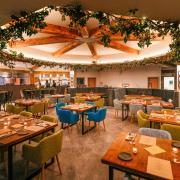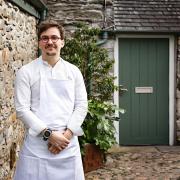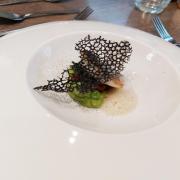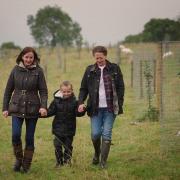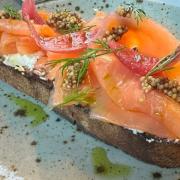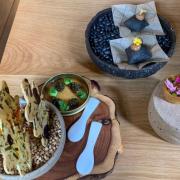One family has farmed the same land for five centuries but they’re far from set in their ways, writes Philippa James
It’s obvious Ian O’Reilly and his partner Emma Robinson, of Gazegill Organics, are not your run-of-the-hill farmers. For instance, they work with The Galloway Society, one of Lancashire’s oldest charities, letting blind people drive tractors on the farm - under supervision, of course.
And they do have the occasional drama. Most recently, the milking parlour had its electrics wiped out by a bolt of lightning. ‘At first, with the wet floor, I thought we’d lost most of the herd, but all was well,’ Emma chuckles. ‘Mind you, I’ve never seen such wide awake cows!’
But the real reason this farm, at Rimington, near Clitheroe, stands out from the crowd is for what it produces and the way it does it. If you ever yearned for the days when your milk came with a delicious creamy top, look no further.
This farm is one of only 78 in the UK to sell ‘green top’, which is raw, unpasteurised milk. They also sell pasteurised, where a golden band of cream sits atop the milk. What they won’t supply is homogenised, which Ian describes as ‘brutalised’ milk.
But Gazegill isn’t stuck in the past. It has an imposing new, fully-automated bottling plant and there are plans to produce raw and pasteurised semi-skimmed and a range of organic ice creams. Working with Maurizio Bocchi, of La Locanda in Gisburn, they will also produce soft, Italian-style cheeses.
The same family has been farming at Gazegill for 500 years – a remarkable achievement. And the next generation can be seen in the form of Niamh, 10, Isabel, five, and Oliver, three. When I arrive they are patting Hyacinth, so called because for the first few days on the farm she constantly ‘bashed her bucket’.
The farm raises dairy and beef shorthorns because they are stocky beasts which calve easily, and the milk has a good buttermilk content. According to DairyCo the ‘useful’ life of most milkers is six years, but here they often have animals well into their teens, and ‘Dad’s Cow’ is 17, a testament to good care and good grazing.
As well as producing meat from Hampshire Down sheep and a herd of very rare Oxford Sandy and Black pigs, Ian and Emma also sell rose veal. This prevents bull calves being slaughtered at birth or being exported at six weeks, often to be re-imported here as veal at £38 a kilo.
Although controversial, a wind turbine is being installed which, as well as covering the electrical needs at Gazegill, will free up funds to take on an apprentice to work alongside butcher, Sarah Swarbrick, in the farm shop where their meat is sold to the public on Friday and Saturday. They supply across the north west to the trade, too.
On this farm, they have recently delivered a two-day-a-week ‘Gazegill Education Project’ to help integrate those with disabilities into work environments. It has just been approved for a new ‘Care Farm Project’, a social enterprise that will provide organic herbs and each pack will have the individual ‘story’ about the student who helped cultivate them. Ian said: ‘We are keen to put something back into the community.’
Meadow land at Gazegill now produces 70 species of indigenous wild flowers, the likes of foxgloves and ragged robin, which are replacing Himalayan balsam. The next project is producing a range of bedding plants and with three orchards providing apples, plums and greengages, chutney making is on the horizon.
The on-site, Education Centre has delivered free sessions to 250 schools and groups in the last year. When primary schools visit they tour the farm then make their own butter, fresh fruit, farm-cultured yoghurt and ice cream.
They plan a cookery school for 24 students. Ian believes we need to get ‘back to basics’ of eating healthily. ‘The best thing you can do is put good food into your body,’ he said. ‘Never mind all this ‘two chickens for a fiver’. Have you seen the conditions those hens are raised in?’ We returned to the farm from The Duke of York, at Grindleton, where chef-patron Michael Heathcote put together some sumptuous dishes using Gazegill meats.
Emma and Ian start work at 5.30am, and rarely finish before 7pm and, although there is always a freshly prepared meal on the table, the couple worry they don’t spend enough time with the children. However, seeing them running around the farm and hearing of their family outings in a semi-retired horse and carriage for picnics , I can’t think of a more idyllic way to grow up.




